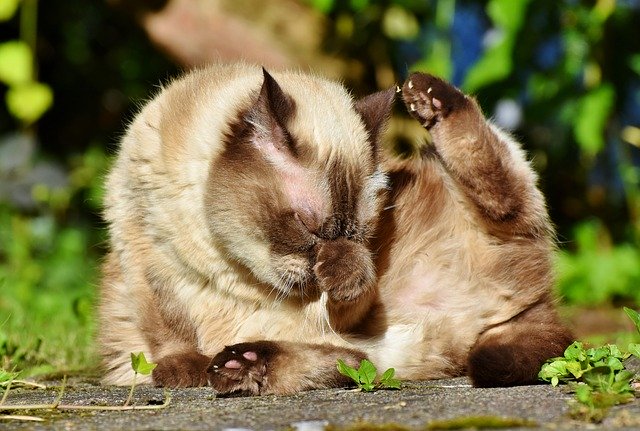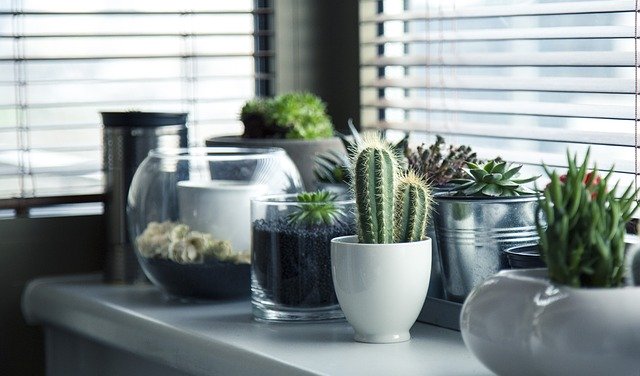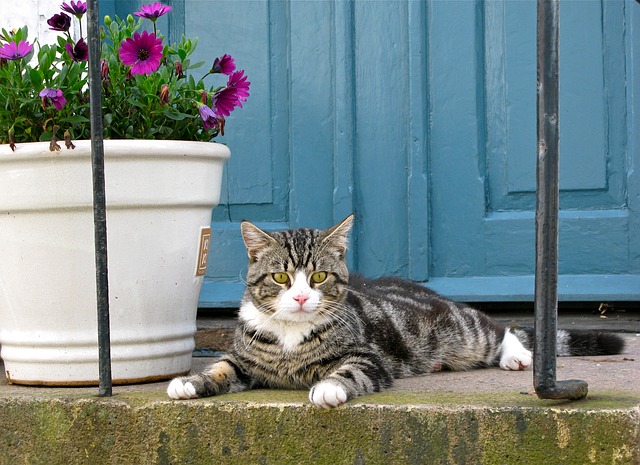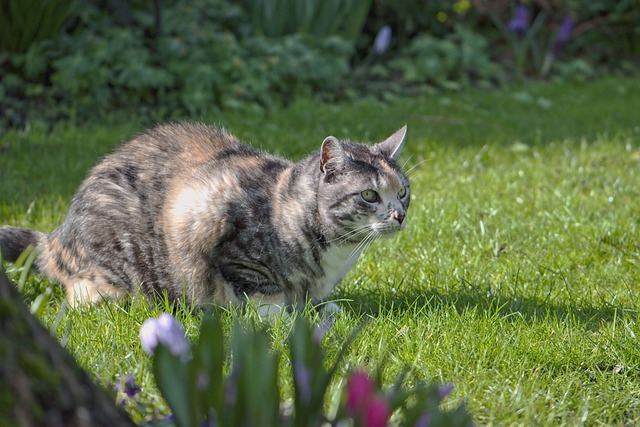Are succulent plants poisonous to cats? One of the most common questions to cat owners, and it is our today’s discussion. Succulents are the new trend on the block. People might wonder why Succulents are all the rage these days in gardening worldwide. And why not? They are easy to plant, low care and maintenance, don’t require that much to thrive in full sun and part sun, and frequent watering is not needed. Not to mention that they look fantastic!
Hopefully, your cat’s not chewing on your plants or just digging them up for fun, causing damage. Which begs the question, are succulent plants poisonous to cats?

What Are Succulent Plants, Really?
For those who don’t know, succulent plants are only moist plants that store a lot of water in their leaves to cope with drought and harsh soil conditions. Take the prickly pear as an example or the cactus or the agave.
Some might call them fleshy plants due to their thick leaves and because of it’s flesh like feel when being touched. Having that said, these plants can grow and give different beautiful shapes.
Also, Succulents are used for ornamental purposes, and this is because of their various shapes, as mentioned before, which makes people prefer growing them over other plants, not to mention that they make an excellent gift to anyone, really.

Are Succulent Plants Poisonous To Cats?
While some succulent plants are poisonous to cats when ingested, they might cause some minor skin irritation. Fortunately, many of these succulent plants are considered non-toxic. They are relatively harmless to pets when ingested, to the point that some might argue the majority of them are safe.
Here are 8 succulent plants that are toxic to cats:
- Kalanchoe Delagoensis (Devil’s Backbone)
This plant is relatively easy to grow; these are poisonous to cats and other pets. They can be quite fatal Ingested in large amounts. We are making it the number one on top of our list.
- Kalanchoe Tomentosa (panda plant)
While having a simple and harmless look and also being a very popular household plant, this plant is nearly as deadly as the Kalanchoe Delagoensis if consumed in large quantities. With that said, these plants can be grown indoors and outdoors, obligating the cat owner to pay attention to his household front yard area and your neighbor’s yard.
“The cat does not offer services. The cat offers itself. Of course he wants care and shelter. You don’t buy love for nothing. Like all pure creatures, cats are practical.” –William S. Burroughs
- Kalanchoe Daigremontiana Or Bryophyllum Daigremontianum (Mother of Thousands)
An attractive and unique looking plant with large green leaves that form tiny plantlets along the edges. These plantlets are well known to grow anywhere they may land, making it difficult to get rid of their rapidly growing properties.
While being a nuisance to some, these plants are quite tough and can tolerate intense heat and bad weather once they grow up. If consumed by your cat, it can result in vomiting, diarrhea, weakness, and abnormal heart rate.
- Aloe Vera
This common household plant is often used for its medicinal properties, such as treating sunburns. Despite the fact it being so beneficial to you, it doesn’t mean it’s any good to your cat. If your cat consumes this plant by chance, your cat may display poisoning signs such as lethargy, vomiting, and diarrhea.


- Sansevieria Trifasciata (Snake Plant)
This gorgeous looking plant causes nausea, diarrhea, and vomiting if consumed by your cat. You can identify the snake plant form its vertical, stiff leaves with a mix of yellow lines or yellow blemishes.
- Euphorbia Tirucalli (Pencil Cactus)
This thorny, pencil looking cactus can be highly alluring to your cat to play with, but it can be highly irritating to its skin as well. Once in contact with the skin, it causes a rash, and if consumed, it can result in irritation of the stomach, mouth, and intestines, causing severe stomach pain, vomiting, and diarrhea.
- Crassula Ovata (Jade plant)
This lovely succulent shrub or small tree has shiny green leaves with some redness on edge. While having the look of a tree, this plant can be tempting to your cat, but if your cat consumes any of the plants’ wooden stems of oval leaves, it will most likely experience vomiting and incoordination, lethargy, and low heart rate.
- Crassula Arborescens (Silver Jade Plant)
Crassula Arborescens are identified by their features like their ‘silver dollar’ leaves, which are round and silvery-green in color with reddish edges. The plant is quite pleasant to look at, and most people plant outdoors, which means owners should pay attention to their household surroundings. If consumed by your cat, it can cause nausea and vomiting, making it less harmful than the other plant on the list.

How Do I Deal With A Cat And A Succulent Plant In The Same Household?
You can use some of these methods to help prevent any interaction between your cat and your succulent plant.
- Present to your cat a toy to play with.
- Make a sprayer of water and lemon juice to prevent the cats from approaching the plant.
- Sprinkling hot peppers at the base of the succulents keep cats away from the succulents.
- Collect aloe vera and succulents in one container.
Grab Your Gift From Our Freebies Page! Click Here
What Do I Do If My Cat Ingested Or Got Exposed To My Succulent Plants?
If your cat got exposed or ingested some poisonous plants, do not hesitate to contact the veterinarian and make a complete medical checkup on your animal. You can also provide your cats medical records to help the doctor analyze the animal’s physical functions, the type of treatment appropriate, and whether your pet needs to stay in the hospital or not.

What Do I Think About Today’s Question, Are Succulent Plants Poisonous To Cats?
Just like what I always say, “when in doubt, search it up.” Getting information about non-toxic and toxic plant species and avoiding keeping them at home will be your best bet and more attentive to your household surroundings. However, keep your guards out for non-toxic plants, as they may also cause digestive problems if ingested in large quantities.
Also, knowing in advance the types of your houseplants and determining their toxicity is beneficial if your cat is a little rascal who likes messing around these plants.

To Conclude Today’s Question, Are Succulent Plants Poisonous To Cats?
Indeed we answered the question, are succulent plants poisonous to cats with a yes for some of the succulents and not all of them. Also, no succulents will kill a cat with just one small nibble. However, some rare ones, such as the Kalanchoe plant family, can be lethal if consumed in large quantities, but this is in extreme cases. Most cases will simply result in a cat feeling unwell with a little bit vomiting here and there or diarrhea, and then returning to normal in a couple of hours.
Although poisoning is rare, pets might be in danger if left alone unattended, especially around these plants. So like I said earlier, when in doubt, search it up, you can look up the plants surrounding your household just to make sure they are safe to have around.
You can also check The ASPCA’s (American Society for the Prevention of Cruelty to Animals) website. It provides valuable information and a comprehensive list of toxic and non-toxic plants for cats, dogs, and other house pets. What truly matters for me is to avoid what’s harmful to my cat in any way possible. So for me, searching these topics is worth the effort.
Finally, I hope you found this article useful and informative enough to answer the question, Are succulent plants poisonous to cats?
Let me know your answer down below. Do you have more information about whether succulent plants poisonous to cats or not?
Also, If you have any other questions or different opinions about it, leave a comment below.
?? Enjoyed Reading This Article About Cats & Succulent Plants
Don’t Forget To Follow Us On Our Social Channels. View Here

